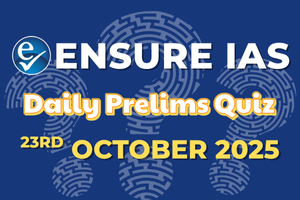Q1. Consider the following challenges faced by the Election Commission of India:
- Managing the logistics of electronic voting machines (EVMs) across vast geographical areas.
- Ensuring the neutrality of polling officers during the election process.
- Addressing the issue of paid news and its impact on the fairness of elections.
- Implementing measures to curb the misuse of social media to influence voter behavior.
How many of the statements given above is/are correct?
Answer: D [All four]
Explanation: Statement 1 is correct: Managing the logistics of electronic voting machines (EVMs) across India is a major challenge due to the country’s vast and diverse geography. The Election Commission must transport, secure, and test EVMs in remote villages, urban centers, and difficult terrains, ensuring they reach over a million polling stations on time. This requires meticulous planning, coordination with local authorities, and contingency measures for natural disruptions like floods or landslides.
Statement 2 is correct: Ensuring the neutrality of polling officers is vital to uphold the integrity of elections. The Election Commission deploys officers from outside their home constituencies and monitors their conduct to prevent bias or influence. Despite these safeguards, concerns about favoritism or political pressure persist, making this an ongoing challenge that requires vigilance, training, and disciplinary mechanisms to maintain public trust in the electoral process.
Statement 3 is correct: Paid news undermines the fairness of elections by allowing candidates or parties to covertly influence public opinion through disguised advertisements. The Election Commission has identified this as a serious issue, especially during campaign periods, and works with media monitoring committees to detect and penalize violations. However, the subtle nature of paid news and lack of clear legal definitions make enforcement difficult, impacting transparency.
Statement 4 is correct: The misuse of social media to manipulate voter behavior is a growing concern for the Election Commission. Platforms can spread misinformation, fake news, and targeted propaganda rapidly, especially during election periods. The Commission collaborates with tech companies to monitor content, enforce advertising rules, and promote voter awareness, but the scale and speed of digital influence pose significant regulatory and ethical challenges.


